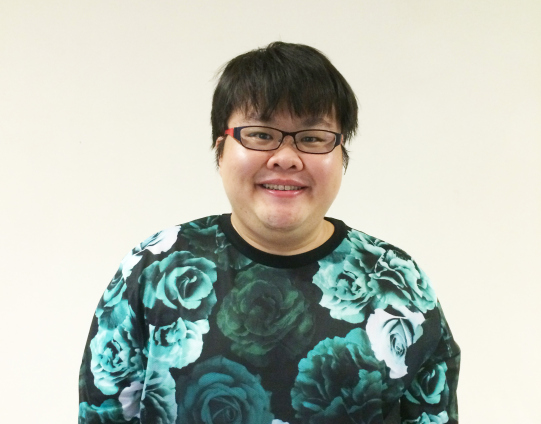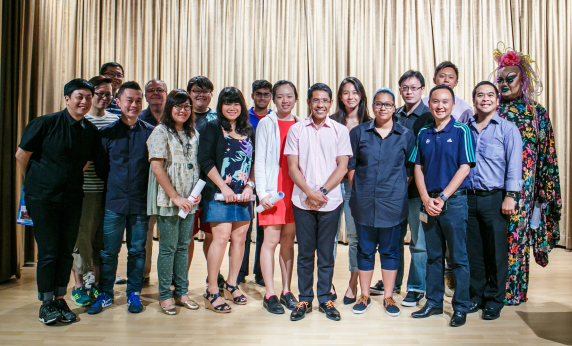
Isaac Lim Jue Hao, a final year Theatre Studies major from the Department of English Language and Literature, has won the top prize at the annual 24-Hour Playwrighting Competition with his play Between Consciousness.
The competition was organised by TheatreWorks Writer’s Laboratory Writing & Community in partnership with the South East Community Development Council. This year’s edition was held from 6 to 7 June at the Institute of Mental Health (IMH) which boasts of lush greenery that provided a serene and calm environment for the promising playwrights to develop their plays.
Recently, we caught up with Isaac to congratulate him on his achievement and to find out more about his winning entry Between Consciousness.
1. Congratulations on the achievement! How do you feel about the award?
It came as a surprise! I was not expecting to win anything this year. This is my fifth time participating in the competition. I attempted a different style of writing this time round and am glad the work resonated with the judges. I’m very encouraged by the award as it recognises my effort as well as my craft. It pushes me to want to explore playwrighting and creative writing even more.
2. Why did you decide to join the competition?
I’ve always been interested in playwrighting and have been regularly taking part in the competition. This year, however, the impetus was definitely the unique venue – the IMH at Buangkok Green. It’s a place that I would not have visited if not for this opportunity. I’ve always treated the event itself as less of a competition and more of a writing retreat. I love to write and taking a weekend off to generate new work cannot be a more perfect break from everything.
3. Tell us more about Between Consciousness.
Between Consciousness is itself an exploration of mental illness and society. The play itself is non-sequitur and crazy. It runs as two parallel stories; one tells about a father and his autistic child and another a mental health doctor coming to terms with expectations of his patients, family and the society. I’d like to think people have alter-egos between different consciousness in their minds and one can never can quite tell fantasy from reality.
4. What was the inspiration behind it?
The father and child story was inspired by a teacher-mentor of mine, who regularly shares stories about his autistic child and their adventures. It has made me rethink about children with special needs and how society looks at them.
At IMH, we learnt that there are many “mental illnesses” that are not apparent to the society. I decided to attempt a pastiche of it all which was presented in a madcap way and hopefully is serious enough to shed light on the matter.
I myself have had episodes of epileptic seizures and a distant cousin with a mental illness thus my personal experiences or “adventures” contributed in part to my writing.
5. Describe the 24-hour playwriting competition experience. (The difficulties faced, the memorable bits etcetera)
We were given the – for the lack of a better word – craziest yet creative stimuli at different times throughout the 24-hour period. These items had to be incorporated into the play in chronological order of their appearance. This includes specific lines a character said and non-specific abstract “objects” like Mamee Monster snacks or a black thrash bag filled with air. They say experience makes it easier, but I’ll deny that. You can never quite expect what the game-masters throw at you, so you just have to keep writing.
It is interesting to make friends at such competitions. Everyone is there to indulge in the passion of playwrighting, so chatting and sharing snacks and drinks during the long night is really fun. It’s akin to a big sleepover party with the most diverse bunch of creatives. It’s nice hitting ideas off one another. Writing is not all that mundane and anti-social act.
6. What is your takeaway from the competition?
Everyone is a bit mental but we should never shy away from admitting or recognising that.
With regards to the competition itself, I believe there is no fixed way of writing for a competition but it is definitely best to try different styles. Even if we don’t emerge as winners, we will walk away with a piece of fresh writing and an experience that is unmatched. The accomplishment of finishing a writing under such constrains is in itself pleasurable in many ways.
7. What are your future plans with regard to theatre and the arts?
I’m currently a final year Theatre Studies major, so I will definitely will be involved in theatre and the arts in one way or another. I do hope that upon graduation, should I not find a job in a theatre organisation, I will still find time to play with like-minded peers. I like to write as much as I like to devise works thus hopefully I will continue to push my creativity and generate new works in the near future.

The Faculty wishes Isaac all the best in his future undertakings!